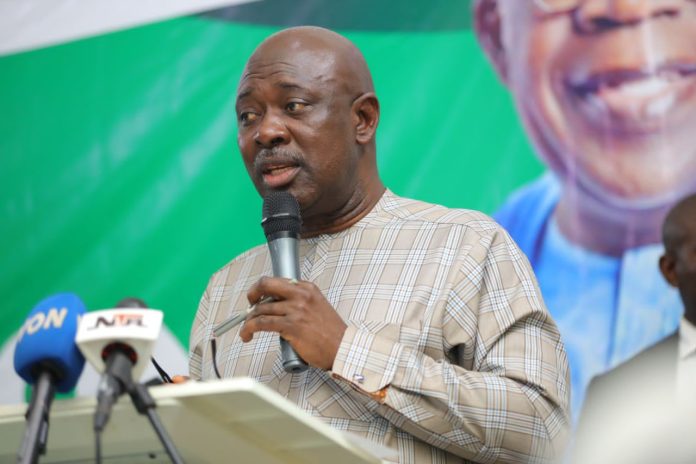Heineken Lokpobiri, Nigeria’s Minister of State for Petroleum Resources (Oil) has disclosed that President Tinubu’s government has been able to increase Nigeria’s oil production to 1.7mbpd.He said the figure is higher than the situation about a year ago when the government assumed office.
“Today, I am proud to report that we have increased our production to approximately 1.7 million barrels per day (inclusive of condensate). This increase is a testament to our relentless efforts to streamline operations and resolve conflicts among stakeholders.”Lokpobiri said while addressing the press during the Sectoral Press Briefing organised by the Ministry of Information and National Orientation on Thursday.
He said earlier, it was his “distinct honor to present an update on our achievements in the oil and gas sector over the past year of this administration. This progress report is based on the Renewed Hope Agenda Number 4 of Mr. President, which aims to unlock the natural resources of our great nation for economic prosperity.
Continuing, he said, “When we assumed office, the biggest challenge met by this administration was a dire lack of investment in the Nigerian oil and gas sector, due to the protracted passage of the Petroleum Industry Act (PIA) and inconsistent government policies, which drove potential investment to other climates.
“As such our primary policy thrust was, and remains, to increase production. You may ask, why is this our focus? Because increased production is the lowest hanging fruit for Nigeria’s economic recovery. Higher production translates to greater investments, increased revenue and foreign exchange for the country, and a more functional midstream and downstream sector.
“We recognized numerous impediments to our progress early on, such as: conflicts among partners, divestment issues, inconsistent policies, insecurity, and bureaucratic bottlenecks. Consequently, over the past nine months our efforts have been dedicated to removing these obstacles, restoring investor confidence, and ensuring an enabling environment for business in the oil and gas sector to thrive.
“Allow me to outline our key achievements:
- Increased Production: Our foremost achievement is the significant increase in production. When we took office, production was at approximately 1.1 million barrels per day, including condensates. Today, I am proud to report that we have increased our production to approximately 1.7 million barrels per day (inclusive of condensate). This increase is a testament to our relentless efforts to streamline operations and resolve conflicts among stakeholders.
- Read other highpoint of his briefing below:
Steps taken to Increase Crude Oil Production include:
- Efforts towards revamping redundant oil assets to active status
- Continuous engagement with IOCs and Independent Petroleum Producers Group (IPPG) members in resolving industry disputes towards increasing production.
- Resolutions of internal Joint venture contracts feud between joint ventures partners on critical productions fields.
- Engaging local communities with critical assets running through them to protect the assets all in a bid to decrease oil theft in the country.
- Consolidating existing security framework with private security firms and Government security agencies for pipeline surveillance, which led to sharp decline in crude oil theft and thus increased production for export.
- During this period, we also experienced the coming on stream of OMLs 13 (Sterling Exploration) and 85 (First E&P), with the respective assets reaching first oil in the development of their licenses. These assets are expected to produce an average of 20,000 and 40,000 barrels per day respectively. This achievement is another testament to the commitment of this administration to optimize production from the nation’s oil and gas assets by providing an enabling environment for existing and prospective investors.
- Attracting Investments: One of our main objectives has been to create an environment where investment can thrive. For over a decade, the non-passage of the Petroleum Industry Act (PIA) and inconsistent policies had driven investments away. Today, I am pleased to announce that our efforts have rekindled investor confidence in the sector. Notable examples include:
- Investments committed to the tune of $5bn and $10bn respectively in deepwater offshore assets; and $1.6bn investment commitment in oil and gas asset acquisition.
- The very high global interest noted in the ongoing bid round of assets coming online, arising from the recent roadshow activities in the US and Europe.
- Eliminating Bureaucratic Bottlenecks: We have been working diligently to eliminate the bureaucracies and bottlenecks that have stifled investment for over a decade. By resolving conflicting issues and fostering a more consistent policy and business friendly environment, we have made significant strides in attracting and sustaining investments in the sector. This also extends to:
- Extension of oil prospecting licenses to technically and financially capable indigenous and international companies all geared towards increasing production, and
- Providing ministerial consent to companies to divest some of their equity in their assets to companies of proven technical and financial capability.
As I have mentioned on numerous occasions you do not need to know me for me to sign off on your asset acquisition application, once you are of proven technical and financial capacity I will sign off!!!
- Returning Service Companies: the business-friendly efforts of this administration has rekindled investors’ confidence in our oil and gas sector and ensured the return of companies such as industry service providers who had earlier seized or greatly reduced operations in our shores due to the unfavorable business climate. For example, last night I met one on one with SLB’s global CEO, who further solidified their commitment to Nigeria.
- Downstream Sector Improvements: Our efforts have extended to the downstream sector. The recent Christmas holiday period witnessed a festive season without fuel queues, a notable achievement attributed to the concerted efforts of stakeholders, especially the Nigerian National Petroleum Corporation Limited (NNPCL) and the Nigerian Midstream and Downstream Petroleum Regulatory Authority (NMDPRA). This is alongside our policy of constant and continued engagement with critical industry stakeholders such as MEMAN and NARTO, IPMAN amongst others to ensure smooth and effective distribution of petroleum products across the nation.
Ladies and Gentlemen, these achievements signify that confidence is returning to Nigeria. To sustain this investment flow, we must maintain consistency in our policies and continue to address our challenges head-on.
In conclusion, I am proud of the progress we have made over the past year. While there is still much work to be done, this administration’s outlook for the sector remains positive. I am confident that with continued dedication and collaboration, we will achieve our goals and secure a prosperous future for Nigeria’s oil and gas sector.
Thank you.




